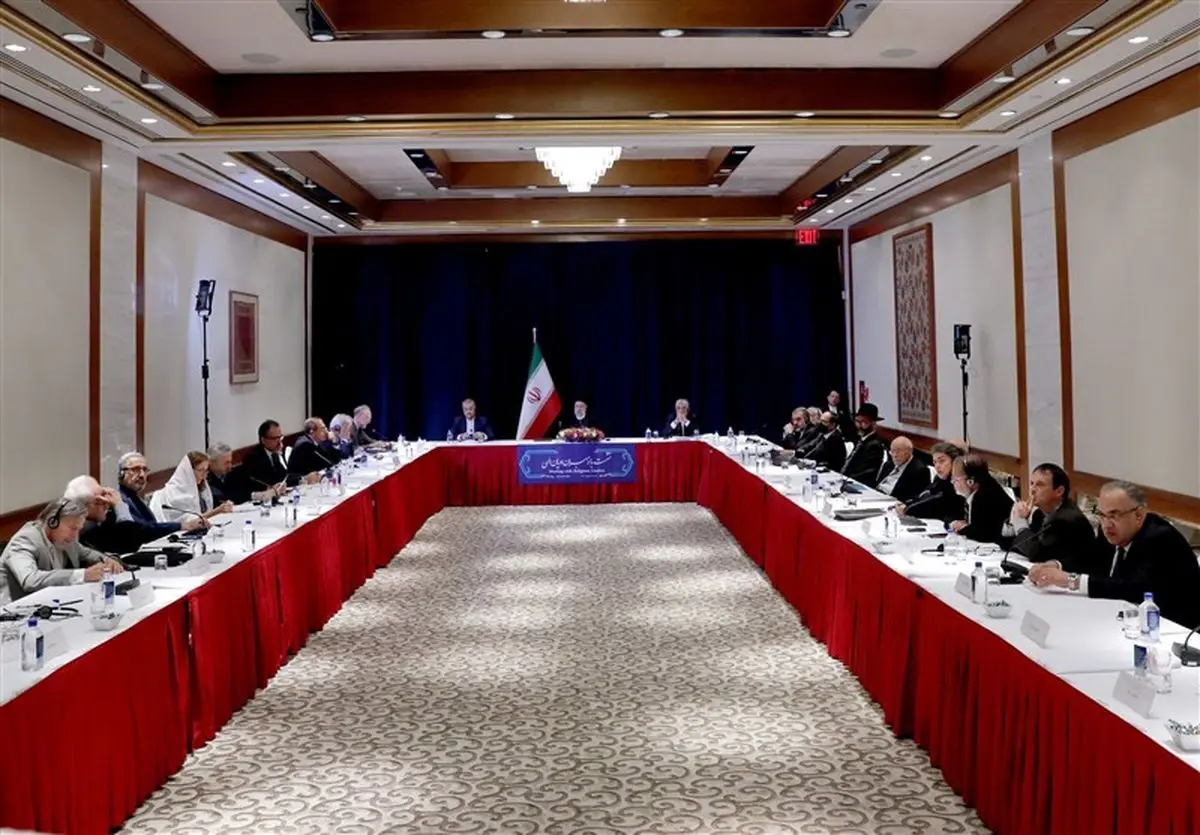Iranian President Calls for Dialogue among Religions

Warning about the harmful effects of conflict and friction between divine religions on societies, Iranian President Ebrahim Raisi stressed the need for conceptual dialogue for the proximity of various religions.
Raisi had a meeting with the leaders of the divine religions on the sidelines of the UN General Assembly in New York on Tuesday.
Stating that the common point of all followers of the divine religions is worshipping God, the president said, "Let's put attention to God as a common principle of divine religions."
All believers in divine religions agree on the point that a society without God and belief in the origin and resurrection creates destruction for mankind, not growth and prosperity, he noted, adding, "Humanity faces two bloody and catastrophic world wars and 70 years of oppression of the Palestinian people as a part of the examples of excluding God from the field of society administration, so it is necessary to consider the belief in God alongside all decision-making."
The unity of divine religions does not mean that people give up their religion, Raisi said, stressing, "Unity does not mean that the followers of different religions give up their religion, but it means we should emphasize the points of commonality, especially worshipping God, and put aside differences."
The Iranian president described worshipping God and attention to divine laws as the biggest obstacle in the path of arrogance, self-centeredness and desire to dominate others, and clarified, "The basis of oppression in the world is due to arrogance and self-aggrandizement, and the way to refrain from it is to pay attention to divine laws."
Raisi stated that the right to social life does not mean that someone has the right to impose his personal wishes and perceptions on others, and pointed out, "Domination is one of the manifestations of atheism, which deprives other people of the opportunity to think."
The president described monotheism and justice as two pillars emphasized and accepted by all divine religions, and said, "It is in the light of justice that man can live a healthy, safe and easy life. According to Imam Muhammad Baqir (PBUH), when a person has correctly adjusted his relationship with himself, with God, with others, with existence and nature, he can be on the path to perfection."
He said that today, along with the spread of atheism, the tendency towards religion has also spread a lot, especially among young people. "The spread of spirituality among societies is a responsibility for the leaders of the divine religions, and the leaders of the divine religions should be careful and serious about the occurrence of any conflict between divine religions."
The president considered the conflict between divine religions as the cause of the erosion of religions and the spread of atheism in societies, and noted, "Instead of conflict and elimination, we should propose and establish an intellectual dialogue between religions, so that the opinions of the followers of different religions can become closer with each other."
Referring to the scourge of attacking religion under the guise of religiosity throughout history, he added, "Daesh (ISIL or ISIS) committed terrible crimes in the name of God and with its flag in the name of God and the Messenger of God (PBUH) that no religious and free person approves of.
"If we want generations to be inclined towards religion, we must be sensitive to oppression and violation of human rights," he noted.
Referring to the huge and unique Arbaeen march, the president said, "This march commemorates the symbol of oppression and standing against oppression, a symbol that showed humanity that if there is silence in the face of oppression, corruption and oppression will cover the whole society."
He further expressed Iran’s readiness to host a meeting of dialogue between divine religions and said, "I also suggest that you continue holding these meetings as an opportunity for mutual thinking and synergy to solve the problems and knots of contemporary human life."
